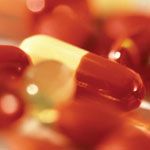
Vitamins – we all need them, but how do we get them?
We all need vitamins to keep our bodies healthy and in good working order. Vitamins are organic compounds that occur naturally in foods – our bodies can’t produce them ourselves, so you need to eat the right foods to provide your body with the vitamins it needs.
Most of us are lucky enough to have access to a wide variety of healthy foods. This means that we should be getting all the vitamins we need. But with all the junk foods available today, a lot of us are not eating the foods that we should, depriving our bodies of the vitamins we need.
Can vitamin supplements help?
A bad diet can’t be made into a good diet just by adding vitamin supplements. For most of us, there’s really no substitute for a healthy diet with plenty of fresh fruit and vegies, cereals and grains, nuts and seeds, dairy products, lean meat and fish.
However, there are some people who might need vitamin supplements. People who may benefit from supplements include:
- Pregnant and breastfeeding women;
- Heavy drinkers;
- Smokers;
- The elderly (especially those who are disabled or chronically ill);
- People who get very little physical activity;
- Some vegetarians and vegans; and
- People with allergies to particular foods.
Remember – vitamins are not drugs or some kind of miracle cure. Before taking any vitamin supplement, you should ALWAYS SEE YOUR DOCTOR, especially if you have a health condition or are taking other medications, or if you’re pregnant or breastfeeding.
Vitamin supplements can become poisonous in large doses, so if you do take a supplement, choose a low dose one. Also, taking vitamin supplements should be viewed as a short term measure only.
How much do I need?
We really only need a small amount of vitamins every day, and you can get these easily by eating the right foods. Here is a guide to
Vitamin A
Vitamin A is essential for normal vision, growth, infection protection and a healthy reproductive system. You can find vitamin A in red, yellow, green and orange fruit and vegetables, as well as cheese, liver and butter.
Vitamin B
A family of vitamins which are essential for healthy nerves, skin, eyes, hair, liver and brain function, and energy. You can find B-group vitamins in cereals, lean meats, milk eggs, fish, peas, poultry and whole grains.
Vitamin C
Vitamin C is needed for hundreds of metabolic processes such as tissue growth and repair, healthy gums and wound healing. It also contributes to nervous and immune system efficiency. Vitamin C is also crucial for healthy bones, teeth and blood vessels, and can help the body absorb iron.
Good sources of vitamin C include blackcurrants, raw red capsicums, guavas and citrus fruits such as oranges and grapefruits. Other good sources include strawberries, kiwifruit, broccoli and brussels sprouts.
Vitamin D
Vitamin D is necessary for normal growth and development of bones and teeth in children, and is important in the prevention of osteoporosis because the body needs it to adequately absorb calcium. It is also involved in muscle strength and the regulation of the heartbeat. V
Good sources of vitamin D include oily fish, eggs, butter, margarine and cheese.
Vitamin E
Vitamin E is a fat-soluble vitamin and is a powerful biological antioxidant. Antioxidants such as Vitamin E act to protect the cells against the effects of free radicals, which are potentially damaging by-products of energy metabolism. Foods rich in Vitamin E include vegetable oils, nuts, green leafy vegetables, sunflower seeds, brown rice, eggs, milk, soya beans and sweet potatoes.
What about minerals?
Minerals are also important in keeping our body healthy. They are involved in chemical reactions that control cell growth and repair, metabolism and nerve and muscle function.
Some essential minerals include:
- Potassium – found in fruit, green leafy vegetables and potatoes
- Iron – found in red meat, chicken and fish
- Zinc – found in oysters, liver, red meat, cereals and dairy foods
- Calcium – found in milk, cheese, yoghurt and salmon with bones
- Selenium – found in plant foods, seafood, poultry and eggs.